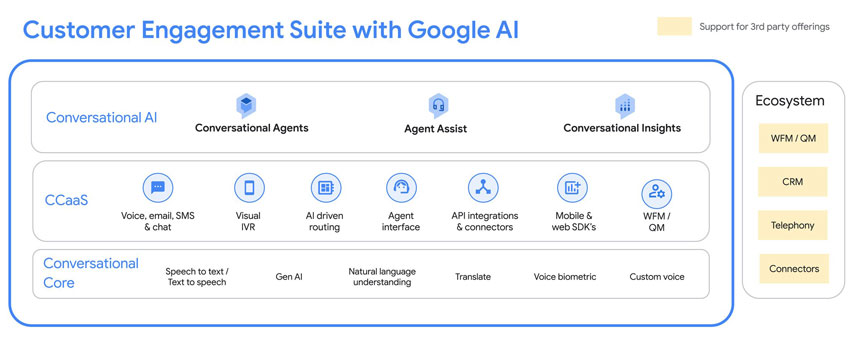Google has unveiled several advancements to its Customer Engagement Suite.
The suite houses its CCaaS offering – formerly the Google Contact Center AI Platform – alongside several conversational AI solutions.
Many of its core capabilities are evident in the graphic below.

Consider the top layer of this graphic. It features Conversational Agents, Agent Assist, and Conversational Insights.
These solutions support customers, service reps, and contact center agents, respectively.
As part of its latest release for the Customer Engagement Suite, Google has advanced each solution to improve the experience of each stakeholder. Here’s how.
Google Adds a Console to Build Conversational AI Agents for Self-Service
Google has added a Conversational Agents Console to the Customer Engagement Suite. The Console enables users to “rapidly” spin up AI agents for self-service.
As such, businesses can automate specific contacts by describing in natural language how the AI agent should resolve the query and pointing the agent to relevant knowledge and data sources.
While other CCaaS vendors have put forward similar innovations, Google aims to differentiate via reporting, testing, and out-of-the-box connectors.
In doing so, the tech giant provides “new” evaluation capabilities to benchmark AI agent performance, track trends in customer intent, and build feedback loops.
Additionally, Google provides test-case instrumentation, allowing businesses to validate the quality of AI agents at scale.
Meanwhile, it’s also introducing 30+ data retrieval and 70+ action connectors to bolster each agent’s knowledge and enable them to trigger processes in other systems to fully automate more queries.
Yet, Google is not just giving organizations the tools to build their own agents; it’s also pre-packaging them to help contact centers get up and running faster.
Indeed, it’s now launching AI agents for appointment booking, flight reservations, movie ticketing, and shopping assistants, with more on the way.
While customizable, these agents leverage some of the aforementioned connectors and various Google products, such as Calendar for booking appointments and BigQuery for data retrieval.
Finally, all Conversational Agents will now utilize Google’s latest voice models, with 30 new voices and various tones to choose from. Each comes with steerable voice instructions and configurable emotions, pauses, and pronunciations.
Gemini Goes to Work on Agent Assist & Conversational Insights
One of Google’s contact center differentiators is its first-party LLM: Gemini.
With Gemini, it can drink from the tap of AI, driving faster and more cost-effective innovation.
Some of this innovation is highly original, too, as evident in its latest AI Trainer and AI Coach tools, which are now available in public preview.
The AI Trainer presents AI-powered simulations of customer conversations. As live agents engage in these simulations, the system offers real-time, personalized advice to support staff development.
Moreover, the solution provides a safe, controlled environment for agents to learn, which may help accelerate time to proficiency.
As agents move from the safe training environment to the contact center floor, the AI Coach supports them in delivering real-time contextual coaching and guidance.
In doing so, it offers recommendations during complex interactions, pinpoints upselling opportunities, and retrieves information from integrated systems.
While these announcements concern Agent Assist, the AI Trainer and Coach make performance observations that feed through to supervisors via Google Conversational Insights.
More Google CCaaS Advancements
It’s not just the conversational AI element of the Customer Engagement Suite that has had a makeover; its CCaaS features have, too.
For starters, Google has introduced a new standalone agent desktop client that provides an “out-of-the-box” multimodal, omnichannel interface.
Google’s Agent Assist capabilities are available via the interface, including generative knowledge assist, post-contact summarizations, and the new AI coach.
Yet, perhaps more notably, it allows organizations to “easily” integrate third-party systems of record, like a CRM, while offering a fully customizable layout.
Elsewhere, Google also provides a new co-browse tool, so agents can view what customers are seeing on their screens to support faster resolutions.
Lastly, the cloud juggernaut added customizable dashboarding capabilities, leveraging features from Looker to support supervisors and managers to better monitor contact center performance.
That solution – alongside the prebuilt AI agents – highlights the potential Google has to tailor capabilities from its broad portfolio for the contact center, driving original feature development.
Indeed, with that broad portfolio, Gemini, and Kubernetes base, Google has several advantages as it aims to grow into the contact center space.
Already, it has secured several megadeals, flaunting success stories in implementing the Customer Engagement Suite with the likes of loveholidays, TTEC, and YouTube.
Yet, Google does lack market visibility, which is surprising, given its size. That lack of marketing push has caused debate as to its intent in the space.
Nevertheless, with its innovation streak and sophisticated platform features, it’s a welcome addition to the contact center market.







